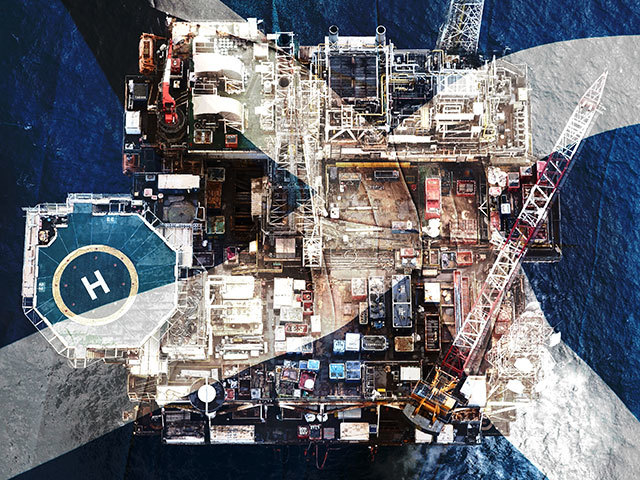
The discovery of North Sea riches in the 1970s planted the seed of modern-day Scottish separatism as nationalists cried “It’s our oil!”
Four decades later, nothing will be more important to the economic future of an independent Scotland than the oil industry should the country vote to end the 307-year-old union with the rest of the UK.
Reserves of oil and gas would be split, possibly along the so-called median line, already used to allocate fishing rights. The division would hand the Scots about 96% of annual oil production and 47% of the gas, according to estimates for 2012 by the University of Aberdeen’s Alex Kemp and Linda Stephen cited by the Scottish government.
With a week to go before the referendum on 18 September and opinion polls showing the result is too close to call, the question is whether oil production, which has plummeted about 40 percent in four years, could finance a newly created state.
“There’s a lot of talk of massive new developments in the North Sea but the trend in output has been downwards for the last 10 years at least,” David Bell, professor of economics at Stirling University, said in an interview on 9 September.
While Scotland’s economy has strengths in tourism, finance and even whiskey, oil will remain vital. With public spending about 1,300 pounds ($2,100) per person higher in Scotland than the U.K. as a whole, “the Scottish government will have to rely on oil revenues from the North Sea to make up the difference,” Bell said.
That income is volatile because of oil prices – with the rate for benchmark Brent crude swinging 17 percent from high to low this year alone – as well as output that fluctuates depending on investment, exploration, extraction and depletion of reserves.
The uncertainties have opened a chasm between competing forecasts for revenue and the public services it could fund, pitting the devolved Scottish administration of First Minister Alex Salmond against the U.K. government.
Samir Brikho, chief executive officer of Amec Plc, the UK’s second-biggest oil and gas engineer, on 7 August said: “The market is nervous as it doesn’t know what’s going to happen.
“We need clear policies and a clear, stable tax regime.”
Royal Dutch Shell Plc CEO Ben van Beurden and BP Plc chief Bob Dudley have both said preserving the union is good for the oil industry and the economy.
Both companies led the development of North Sea fields in the 1970s and 1980s. That was a period that saw the Scottish National Party move from being a fringe political force as they campaigned to keep growing revenue from the fields, which lie off Scotland’s eastern coast.
Production PeakNorth Sea production has long since peaked. The Office of Budget Responsibility, an independent body set up to report on public finances, forecast UK oil and gas receipts falling to £3.5billion by 2018-19 from £4.7billion in 2013-14. It assumes a slide in oil prices to $99 a barrel and steady production over the period.
While the OBR is more pessimistic than some, actual money raised has often come in below its figures. All six of its budget forecasts that included outlooks for 2013-14 were higher than the outcome.
The figures contrast with those set out by the Scottish administration, which sees, in its central scenario, revenue for Scotland alone reaching £5.8billion in 2014-15 and £8.3billion the next year. It expects prices of $110 a barrel, while using an estimate from industry lobby Oil & Gas UK for output to rise about 14% from 2013 to 2018.
Brent has dropped 10% in the past three months and was trading at about $98 a barrel yesterday. Analysts surveyed by Bloomberg estimate that the average price on the ICE Futures Europe Exchange will be $95 in 2018.
While the Scottish government, in its May 2014 Oil and Gas Analytical Bulletin, doesn’t provide longer-term projections, the OBR shows UK oil and gas revenue declining to as low as an annual £1.3billion in 2029-30 as reserves deplete.
The speed and extent of depletion is also contested.
“Scottish independence has partly been promoted on the basis of oil wealth but as North Sea oil and gas reserves decline, and the costs of recovery increase, that benefit may diminish,” Robert Hamill, a partner at Mayer Brown in London who has worked as an energy lawyer for 30 years, said by phone.
The UK has so far produced the equivalent of about 42 billion barrels of oil offshore and there may be 12 billion to 24 billion barrels left, according to a report in February by Ian Wood, former head of Aberdeen-based oil-services company John Wood Group Plc.
He said yesterday recovery was likely to be 15 billion to 16.5 billion barrels and Scottish government plans for balancing the books were based on “highly unlikely” assumptions. BP’s Dudley and Shell’s van Beurden said separately that they backed Wood’s estimates.
Alex Russell, professor of petroleum accounting at Aberdeen Business School, and Professor Peter Strachan said rising oil prices and improved technology will aid recovery.
Calling OBR figures “ludicrously pessimistic,” they wrote in a Scotsman newspaper commentary that an outcome of 24 billion barrels was “all the more probable given the truly brilliant and innovative approach of the North Sea oil industry.”
Costs are critical for the government as producers are allowed to cover their expenses before paying taxes.
Operating expenditures, even accounting for inflation, are the highest since North Sea production began 40 years ago, Oil & Gas UK said in its Activity Survey 2014. In addition there’s the cost of decommissioning when operations are shuttered.
“This relentless rise in costs is unsustainable and will result in yet more fields being shut-in and prematurely decommissioned if it is not addressed,” the lobby said of operating expenditure. “In such an environment, any significant fall in oil and gas prices could have serious consequences for the industry.”
Recommended for you
